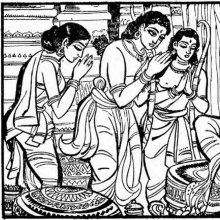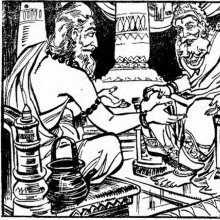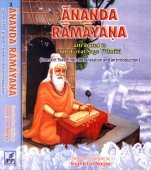Kaushalya, Kauśalyā, Kausalya, Kausalyā, Kauśalya: 18 definitions
Introduction:
Kaushalya means something in Buddhism, Pali, Hinduism, Sanskrit, Jainism, Prakrit. If you want to know the exact meaning, history, etymology or English translation of this term then check out the descriptions on this page. Add your comment or reference to a book if you want to contribute to this summary article.
The Sanskrit terms Kauśalyā and Kauśalya can be transliterated into English as Kausalya or Kaushalya, using the IAST transliteration scheme (?).
Images (photo gallery)
In Hinduism
Purana and Itihasa (epic history)
Source: archive.org: Puranic Encyclopedia1) Kausalyā (कौसल्या).—A queen of King Daśaratha and mother of Śrī Rāma. Daśaratha had three wives Kausalyā, Kaikeyī and Sumitrā. Kausalyā gave birth to Śrī Rāma, Kaikeyī to Bharata and Sumitrā to Lakṣmaṇa and Śatrughna. (Vālmīki Rāmāyaṇa, Bāla Kāṇḍa, Sarga 16).
2) Kausalyā (कौसल्या).—Queen of the King of Kāśī. Ambā, Ambikā, and Ambālikā were daughters of this Kausalyā. Of these daughters Ambālikā also was called Kausalyā. After the death of Pāṇḍu she went to the forest with Ambikā. (Mahābhārata Ādi Parva, Chapter 129).
3) Kausalyā (कौसल्या).—The queen of a Yādava King. She was the mother of the Yādava named Keśin. (Devī Bhāgavata, Skandha 9).
4) Kausalyā (कौसल्या).—Wife of Puru, the son of King Yayāti. Janamejaya was born to Puru of his wife Kausalyā. (Mahābhārata Ādi Parva, Chapter 95, Stanza 11).
5) Kausalyā (कौसल्या).—The queen of Janaka, the King of Mithilā. Once King Janaka decided to sell his palace and everything he possessed and to go abegging for alms. But his brave wife Kausalyā convinced her husband by her reasonable arguments that he should not venture to do so. Thus she prevented her husband from carrying out his decision.
6) Kausalya (कौसल्य).—A teacher, who belonged to the line of disciples of Vyāsa. Jaimini was the disciple of Vyāsa. Sumantu was the son of Jaimini. A son named Sutvā, was born to Sumantu. Sukarman was the son of Sutvā. Sukarman had two disciples Hiraṇyanābha. and Pauṣpiñji. Kausalya was another name of Hiraṇyanābha. (Viṣṇu Purāṇa, Aṃśā 3, Chapter 6).
Source: Cologne Digital Sanskrit Dictionaries: The Purana Index1a) Kauśalya (कौशल्य).—See hiraṇyanābha.*
- * Brahmāṇḍa-purāṇa II. 35. 38.
1b) An Ārṣreyapravara of Aṅgiras.*
- * Matsya-purāṇa 196. 9.
1c) Of Agastya family.*
- * Matsya-purāṇa 202. 1.
2a) Kauśalyā (कौशल्या).—A wife of Vasudeva and mother of Keśin—see bhadrā.*
- * Bhāgavata-purāṇa IX. 24. 48.
2b) A queen of Daśaratha and mother of Rāma.*
- * Brahmāṇḍa-purāṇa III. 37. 31; IV. 40. 112.
2c) A queen of Sātvata; mother of Bhajamāna and others; four branches of the line from them are important.*
- * Matsya-purāṇa 44. 47. Vāyu-purāṇa 96. 1-2.
2d) A queen of Kṛṣṇa.*
- * Matsya-purāṇa 47. 14.
3) Kausalya (कौसल्य).—A siddha.*
- * Bhāgavata-purāṇa VI. 15. 15.
Kausalyā (कौसल्या) refers to the name of a Lady mentioned in the Mahābhārata (cf. I.90.11). Note: The Mahābhārata (mentioning Kausalyā) is a Sanskrit epic poem consisting of 100,000 ślokas (metrical verses) and is over 2000 years old.

The Purana (पुराण, purāṇas) refers to Sanskrit literature preserving ancient India’s vast cultural history, including historical legends, religious ceremonies, various arts and sciences. The eighteen mahapuranas total over 400,000 shlokas (metrical couplets) and date to at least several centuries BCE.
Vastushastra (architecture)
Source: Wisdom Library: Vāstu-śāstraKauśalya (कौशल्य) refers to a variety of maṇḍapa (halls attached to the temple), according to the Matsya-purāṇa (verses 270.1-30). The kauśalya-maṇḍapa is to be built with 56 pillars (stambha). The Matsyapurāṇa is one of the eighteen major purāṇas dating from the 1st-millennium BCE.
Accordingly (verse 270.15-17), “These maṇḍapas (e.g., kauśalya) should be either made triangular, circular, octagonal or with 16 sides or they are square. They promote kingdoms, victory, longevity, sons, wife and nourishment respecitvely. Temples of other shape than these are inauspicious.”

Vastushastra (वास्तुशास्त्र, vāstuśāstra) refers to the ancient Indian science (shastra) of architecture (vastu), dealing with topics such architecture, sculpture, town-building, fort building and various other constructions. Vastu also deals with the philosophy of the architectural relation with the cosmic universe.
General definition (in Hinduism)
Source: Apam Napat: Indian MythologyKausalya was the oldest wife of King Dasharatha of Ayodhya. She is the mother of Rama, the hero of the epic Ramayana. Since King Dasharatha was issueless for a long time, he performed the Ashwamedha sacrifice, also known as the Putra Kameshti sacrifice, with the purpose of obtaining issue. By drinking the nectar obtained from the sacrifice, his wives gave birth to his children. Rama, the eldest, was born to Kausalya.
Source: WikiPedia: HinduismKausalya in the Indian Rāmāyaṇa epic was the eldest of King Daśaratha's three wives and a queen of Ayodhyā, she was the daughter of the King of the Dakshina Kosala Kingdom. She was the mother of Rama, the king of Ayodhya, upon whom the story of the Ramayana is based.
etymology: Kausalya (Sanskrit: कौसल्या Kausalyā, Tamil: கோசலை, Thai: Kausuriya, Khmer: កោសកល្យា, Burmese: Kothalla, Malay: Mandudari)
In Buddhism
Mahayana (major branch of Buddhism)
Source: academia.edu: A Study and Translation of the GaganagañjaparipṛcchāKauśalya (कौशल्य) refers to “skillful (means)”, according to the Gaganagañjaparipṛcchā: the eighth chapter of the Mahāsaṃnipāta (a collection of Mahāyāna Buddhist Sūtras).—Accordingly, “[...] Then, the bodhisatva, the great being, Gaganagañja addressed himself to the Lord: [...] (23) [How are Bodhisattvas] skilled in knowing the entrance into the dependent origination, and free from all views of two extremes? (24) [How do the Bodhisattvas see] the suchness without any differentiation between knowledge (jñāna) and skillful means (upāya-kauśalya) as sealed with the seal of the Tathāgata? [...]’”.

Mahayana (महायान, mahāyāna) is a major branch of Buddhism focusing on the path of a Bodhisattva (spiritual aspirants/ enlightened beings). Extant literature is vast and primarely composed in the Sanskrit language. There are many sūtras of which some of the earliest are the various Prajñāpāramitā sūtras.
In Jainism
General definition (in Jainism)
Source: JAINpedia: Women in the Jain tradition: Soḷ satīKausalyā (कौसल्या) refers to one of the 16 Satīs mentioned in the Brāhmī Candanbālikā.—In Jain contexts “Satī” revolves around fidelity to the Jain religion. Although Jains call many virtuous Jain women satīs, among Śvetāmbara Jains there is a group of satīs called the soḷ satī or 16 Satīs (i.e., Kausalyā). These Jain Satīs are revered as role models for women and their stories are widely known. Even though the general group of Satī grows over time, the group of 16 Satīs is unchanging.

Jainism is an Indian religion of Dharma whose doctrine revolves around harmlessness (ahimsa) towards every living being. The two major branches (Digambara and Svetambara) of Jainism stimulate self-control (or, shramana, ‘self-reliance’) and spiritual development through a path of peace for the soul to progess to the ultimate goal.
Languages of India and abroad
Sanskrit dictionary
Source: DDSA: The practical Sanskrit-English dictionaryKauśalya (कौशल्य).—[kuśala-aṇ ṣyañ vā P.V.1.124]
1) Well-being, welfare, happiness, prosperity; वैदेहि कुशली रामः स त्वां कौशलमब्रवीत् (vaidehi kuśalī rāmaḥ sa tvāṃ kauśalamabravīt) Rām.5.34.3.
2) Skill, skilfulness, cleverness; किमकौशलादुत प्रयोजनापेक्षितया (kimakauśalāduta prayojanāpekṣitayā) Mu.3; हावहारि हसितं वचनानां कौशलं दृशि विकारविशेषाः (hāvahāri hasitaṃ vacanānāṃ kauśalaṃ dṛśi vikāraviśeṣāḥ) Śiśupālavadha 1.13.
3) (kauśalyam) A pavilion with fortysix pillars; Matsya P. (Ch.27) 5.8; योगः कर्मसु कौशलम् (yogaḥ karmasu kauśalam) Bhagavadgītā (Bombay) 2.5.
Derivable forms: kauśalyam (कौशल्यम्).
See also (synonyms): kauśala.
--- OR ---
Kauśalyā (कौशल्या).—[kośaladeśe bhavā chaṇ] The eldest wife of Daśaratha and mother of Rāma.
--- OR ---
Kausalya (कौसल्य).—a. Belonging to the people of the Kosalas; Mahābhārata (Bombay) 7.49.38.
-lyaḥ A prince of the Kosalas; कौसल्यश्चा- श्वलायनः (kausalyaścā- śvalāyanaḥ) Praṣna. Up.1.1.
-lyā The wife of Daśaratha and mother of Rāma.
Source: Cologne Digital Sanskrit Dictionaries: Shabda-Sagara Sanskrit-English DictionaryKauśalya (कौशल्य).—n.
(-lyaṃ) 1. Good fortune, well-being, &c. 2. Cleverness, talent. f.
(-lyā) The mother of Rama. E. kuśala and yañ affix, or kośala a name of the father of this princess, affix ṇyat.
Source: Cologne Digital Sanskrit Dictionaries: Benfey Sanskrit-English DictionaryKauśalya (कौशल्य).—i. e. kuśala + ya, n. Well-being, [Rāmāyaṇa] 5, 31, 26.
--- OR ---
Kausalya (कौसल्य).—i. e. kosala + ya, I. adj. Belonging to the Kosalas, [Bhāgavata-Purāṇa, (ed. Burnouf.)] 6, 15, 15. Ii. yā, f. The mother of Rāma, [Rāmāyaṇa] 1, 1, 17.
Source: Cologne Digital Sanskrit Dictionaries: Cappeller Sanskrit-English DictionaryKauśalya (कौशल्य).—[neuter] welfare, health; cleverness, skill in ([locative] or —°).
Source: Cologne Digital Sanskrit Dictionaries: Monier-Williams Sanskrit-English Dictionary1) Kauśalya (कौशल्य):—[from kauśala] m. a kind of pavilion, [Vāstuvidyā]
2) [v.s. ...] n. ([gana] brāhmaṇādi) welfare, well-being, prosperity, [Mahābhārata; Rāmāyaṇa]
3) [v.s. ...] cleverness, skilfulness, experience (ifc.), [Saddharma-puṇḍarīka; Bhāvaprakāśa]
4) Kauśalyā (कौशल्या):—[from kauśalya > kauśala] f. See kausalya.
5) Kausalya (कौसल्य):—[from kausala] mfn. (often spelt kauś) belonging to the people of the Kosalas
6) [v.s. ...] m. ([Pāṇini 4-1, 171]) a prince of the Kosalas, [Śatapatha-brāhmaṇa xiii; Śāṅkhāyana-śrauta-sūtra; Praśna-upaniṣad; Harivaṃśa] etc.
7) Kausalyā (कौसल्या):—[from kausalya > kausala] a f. ‘daughter of a prince of the Kosalas’, Name of the wife of Pūru and mother of Janam-ejaya, [Mahābhārata i, 3764]
8) [v.s. ...] of the wife of Satvat, [Harivaṃśa 1999]
9) [v.s. ...] of Daśa-ratha’s wife (mother of Rāma-candra), [Mahābhārata iii, 15879; Rāmāyaṇa]
10) [v.s. ...] of the mother of Dhṛta-rāṣṭra, [cf. Lexicographers, esp. such as amarasiṃha, halāyudha, hemacandra, etc.]
11) [v.s. ...] of the mother of Pāṇḍu, [cf. Lexicographers, esp. such as amarasiṃha, halāyudha, hemacandra, etc.]
12) [v.s. ...] b (f. of lya q.v.)
Source: Cologne Digital Sanskrit Dictionaries: Yates Sanskrit-English DictionaryKauśalya (कौशल्य):—(lyaṃḥ) 1. n. Good fortune; dexterity. (lyā) f. Mother of Ramā.
Source: DDSA: Paia-sadda-mahannavo; a comprehensive Prakrit Hindi dictionary (S)Kauśalya (कौशल्य) in the Sanskrit language is related to the Prakrit words: Kosalla, Kosallayā, Kosallā.
[Sanskrit to German]
Sanskrit, also spelled संस्कृतम् (saṃskṛtam), is an ancient language of India commonly seen as the grandmother of the Indo-European language family (even English!). Closely allied with Prakrit and Pali, Sanskrit is more exhaustive in both grammar and terms and has the most extensive collection of literature in the world, greatly surpassing its sister-languages Greek and Latin.
Kannada-English dictionary
Source: Alar: Kannada-English corpusKauśalya (ಕೌಶಲ್ಯ):—[noun] = ಕೌಶಲ [kaushala].
--- OR ---
Kausalya (ಕೌಸಲ್ಯ):—[noun] = ಕೌಶಲ [kaushala].
Kannada is a Dravidian language (as opposed to the Indo-European language family) mainly spoken in the southwestern region of India.
See also (Relevant definitions)
Starts with: Kausalyanandana, Kaushalyah stotram, Kaushalyaka, Kaushalyakusumavali, Kaushalyarthi, Kaushalyayani.
Ends with: Jnanakaushalya, Kalakaushalya, Kriyakaushalya, Sarvarutakaushalya, Shabdakaushalya, Tarkakaushalya, Upayakaushalya, Vipashyanakaushalya, Vyavaharakaushalya, Yuktikaushalya.
Full-text (+80): Kausalyanandana, Kosalla, Kaushalyayani, Kaushaleya, Kausalyamatri, Kaushala, Shatrughna, Mekhalin, Kaushalyah stotram, Dasharatha, Kosallaya, Bhajamana, Kaushilya, Kausalyam, Buddhikaushala, Sarvopayakaushalyapraveshana, Kaushalyaka, Davum Nighanem, Sarvarutakaushalya, Bhajina.
Relevant text
Search found 47 books and stories containing Kaushalya, Kauśalyā, Kausalya, Kausalyā, Kauśalya; (plurals include: Kaushalyas, Kauśalyās, Kausalyas, Kausalyās, Kauśalyas). You can also click to the full overview containing English textual excerpts. Below are direct links for the most relevant articles:
Brihad Bhagavatamrita (commentary) (by Śrī Śrīmad Bhaktivedānta Nārāyana Gosvāmī Mahārāja)
Verse 1.4.100-104 < [Chapter 4 - Bhakta (the devotee)]
Verse 2.4.243 < [Chapter 4 - Vaikuṇṭha (the spiritual world)]
Puranic encyclopaedia (by Vettam Mani)
Chaitanya Bhagavata (by Bhumipati Dāsa)
Verse 3.4.245 < [Chapter 4 - Descriptions of Śrī Acyutānanda’s Pastimes and the Worship of Śrī Mādhavendra]
Verse 2.27.35 < [Chapter 27 - The Lord Pacifies Feelings of Separation]
Verse 2.27.44 < [Chapter 27 - The Lord Pacifies Feelings of Separation]
Ramayana of Valmiki (by Hari Prasad Shastri)
Chapter 65 - The palace is filled with the sound of distress < [Book 2 - Ayodhya-kanda]
Chapter 42 - Without Rama the king’s heart finds no rest < [Book 2 - Ayodhya-kanda]
Chapter 51 - The night is spent on the bank of the sacred river < [Book 2 - Ayodhya-kanda]
Garga Samhita (English) (by Danavir Goswami)
Verse 2.15.17 < [Chapter 15 - Description of Śrī Rādhā-Kṛṣṇa’s Falling in Love]
Verse 2.21.30 < [Chapter 21 - The Rāsa-dance Pastime]
Verse 8.13.27 < [Chapter 13 - A Thousand Names of Lord Balarāma]
The Agni Purana (by N. Gangadharan)
Related products



